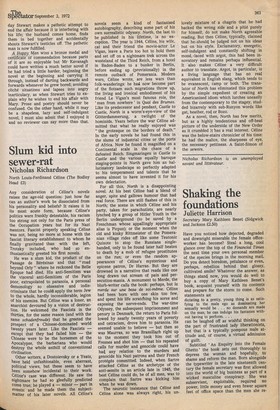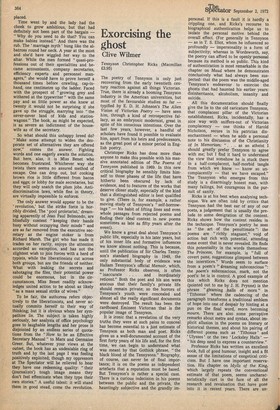Shaking the foundations
Juliette Harrison
Secretary Mary Kathleen Benet (Sidgwick and Jackson £2.50) Have you noticed how dejected, degraded and downright miserable the female officeworker has become? Steal a long, cool glance over the top of the Financial Times the next time your own personal member of the species brings in the morning mail. Do you detect boredom, petulance or even. perhaps, rebellion behind that glossy, cultivated smile? Whatever the answer, as things stand now, you would do well to buy a copy of Mary Kathleen Benet's book, acquaint yourself with its contents and prepare for the storm to come. Such statements as: dictating to a pretty, young thing is as satisfying to the male ego as dominating her sexually would be . . . no demands are made on the man; he can indulge his fantasies without having to perform. . . .
can be laughed off as wishful thinking on the part of frustrated lady liberationists, but that is a typically pompous male attitude and, of course, a virtual admission of guilt.
Subtitled 'An Enquiry into the Female Ghetto' the book sets out thoroughly to depress the woman and hopefully, to shame and reform the man. Born alongside the typewriter in the late nineteenth century the female secretary was first allowed into the world of big business as part of a wicked masculine conspiracy. She was subservient, exploitable, required no power, little money and even fewer square feet of office space than the men she re placed.
Time went by and the lady had the cheek to grow ambitious, but that had definitely not been part of the bargain — " Why do you need to do that? You can make babies instead." And there was the rub. The 'marriage myth' hung like the albatross round her neck. A year at the most and she'd have wiggled her way to the altar. While the men formed "quasi-professions out of their specialities and became accountants, company secretaries, efficiency experts and personnel managers," she would have to prove herself a thousand times before crawling, cap-inhand, one centimetre up the ladder. Faced with the prospect of "growing grey and withered at the typewriter" with the same pay and as little power as she knew at twenty it would not be surprising if she gave up the struggle, marrying into "the never-never land of kids and stationwagons." The book, as might be expected, is as severe an indictment of the housewife as of the secretary.
So what should this unhappy breed do? "Make some attempt to widen the desperate set of alternatives they are offered now" comes the answer. Fighting words and one eagerly awaits the solution. But here, alas, it is Miss Benet who becomes frustrated. Whichever way she twists there seems no assured method of escape. One can drop out, but cooking brown rice is little different from bacon and eggs; or lobby for male secretaries, but they will only snatch the plum jobs. Antidiscrimination laws, while fine in theory, are virtually impossible to enforce.
The only answer would appear to be the 'revolution,' but the strike force is horribly divided. The 'pool proletariat,' dreaming apparently of Jean Paul Belmondo, are blissfully content "keeping their hands busy without occupying their minds" and are as far removed from the executive secretary as the engine stoker is from Richard Marsh. The girl who has made it trades on her rarity, enjoys the attention . accorded an exception, and has not the slightest wish to join forces with a herd of typists, while the liberationists cut across both groups, but are the friends of neither. What with leaking the secrets and sabotaging the files, their potential power could be enormous, but in the circumstances, Miss Benet readily acknowledges united action to be about as likely "as a mass sexual strike of wives."
To be fair, the authoress refers objectively to the liberationists, and never actually commits herself to their way of thinking; but it is obvious where her sympathies lie. The subject is taken highly seriously, her analysis of office psychology goes to laughable lengths and her prose is disjointed by an endless series of quotations from the "How to be an Effective Secretary Manual" to Marx and Germaine Greer. But, whatever your views at the outset, the book has an undeniable ring of truth and by the last page I was feeling positively exploited; though my oppressors at The Spectator will be relieved to hear they have one redeeming quality: "their (journalists') tough image means they don't feel effeminate when they type their own stories." A useful talent: it will stand them in good stead, come the revolution.







































 Previous page
Previous page